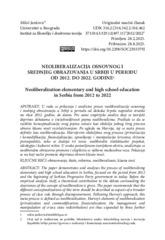Приказ основних података о документу
Neoliberalizacija osnovnog i srednjeg obrazovanja u Srbiji u periodu od 2012. do 2022. godine
Neoliberalization elementary and high school education in Serbia from 2012 to 2022
| dc.creator | Janković, Miloš | |
| dc.date.accessioned | 2023-11-07T17:36:40Z | |
| dc.date.available | 2023-11-07T17:36:40Z | |
| dc.date.issued | 2023 | |
| dc.identifier.issn | 0038-0318 | |
| dc.identifier.uri | http://rifdt.instifdt.bg.ac.rs/123456789/3135 | |
| dc.description.abstract | U radu se prikazuje i analizira proces neoliberalizacije osnovnog i srednjeg obrazovanja u Srbiji u periodu od dolaska Srpske napredne stranke na vlast 2012. godine, do danas. Pre same empirijske analize daje se teorijski doprinos debatama o (ne)uhvatljivosti pojma neoliberalizma. Predlaže se da se različite konceptualizacije ovog pojma označe kao obeležja jednog šireg procesa obnove klasne moći razvlašćivanjem. Po ugledu na Harvija, taj se meta proces definiše kao neoliberalizacija. Harvijevim obeležjima ovog procesa (privatizacija i komodifikacija; finansijalizacija; upravljanje i manipulacija krizama; državne preraspodele), tako se dodaju tri nova: neoliberalni intelektualni projekat, ideologija i kulturni režim. U ovako postavljenom teorijskom okviru, analiziraju se neoliberalne obrazovne promene i eksplicira se njihova međusobna veza. Pokazuje se na koji način promene doprinose obnovi klasne moći. | sr |
| dc.description.abstract | The paper demonstrates and analyses the process of neoliberalising elementary and high school education in Serbia, focused on the period from 2012 and the beginning of Serbian Progressive Party government to today. Before the empirical analysis itself, a theoretical contribution to the debate surrounding the elusiveness of the concept of neoliberalism is given. The paper recommends that the different conceptualizations of this term should be described as aspects of a broader process of class rule through disempowerment. Following Harvey’s approach, this meta-process is defined as neoliberalization. Harvey’s elements of neoliberalization (privatization and commodification; financialization; the management and manipulation of crises; state redistribution) are thus expanded by three further elements: the neoliberal intellectual project, ideology and the cultural regime. In based on this theoretical framework neoliberal changes in education and relationships between them are analyzed. Ways in which these changes contribute towards the restoration of class power is shown. | sr |
| dc.language.iso | sr | sr |
| dc.publisher | Beograd: Sociološko naučno društvo Srbije; Institut za sociološka istraživanja Filozofskog fakulteta u Beogradu | sr |
| dc.relation | info:eu-repo/grantAgreement/MESTD/inst-2020/200025/RS// | sr |
| dc.rights | openAccess | sr |
| dc.rights.uri | https://creativecommons.org/licenses/by/4.0/ | |
| dc.source | Sociologija | sr |
| dc.subject | obrazovanje | sr |
| dc.subject | škole | sr |
| dc.subject | reforma | sr |
| dc.subject | neoliberalizam | sr |
| dc.subject | klasna moć | sr |
| dc.subject | education | sr |
| dc.subject | schools | sr |
| dc.subject | reform | sr |
| dc.subject | neoliberalism | sr |
| dc.subject | class power | sr |
| dc.title | Neoliberalizacija osnovnog i srednjeg obrazovanja u Srbiji u periodu od 2012. do 2022. godine | sr |
| dc.title | Neoliberalization elementary and high school education in Serbia from 2012 to 2022 | sr |
| dc.type | article | sr |
| dc.rights.license | BY | sr |
| dc.citation.issue | 3 | |
| dc.citation.volume | 65 | |
| dc.citation.spage | 379 | |
| dc.citation.epage | 399 | |
| dc.identifier.doi | 10.2298/SOC2303379J | |
| dc.type.version | publishedVersion | sr |
| dc.identifier.fulltext | http://rifdt.instifdt.bg.ac.rs/bitstream/id/10759/bitstream_10759.pdf |

